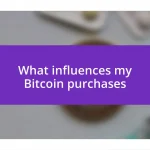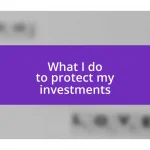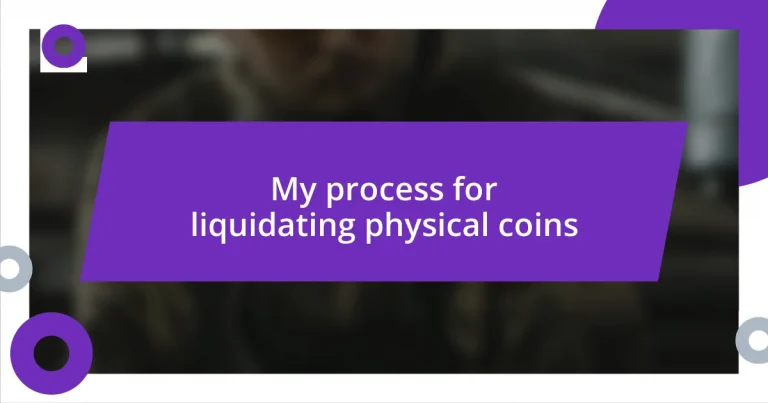Key takeaways:
- Understanding the emotional and intrinsic value of coins is crucial in the liquidation process, impacting both valuation and selling choices.
- Assessing coins involves considering factors such as rarity, condition, historical significance, and market demand to determine their worth.
- Choosing the right selling method and preparing coins for sale, including cataloging and documenting details, can enhance the selling experience and outcomes.
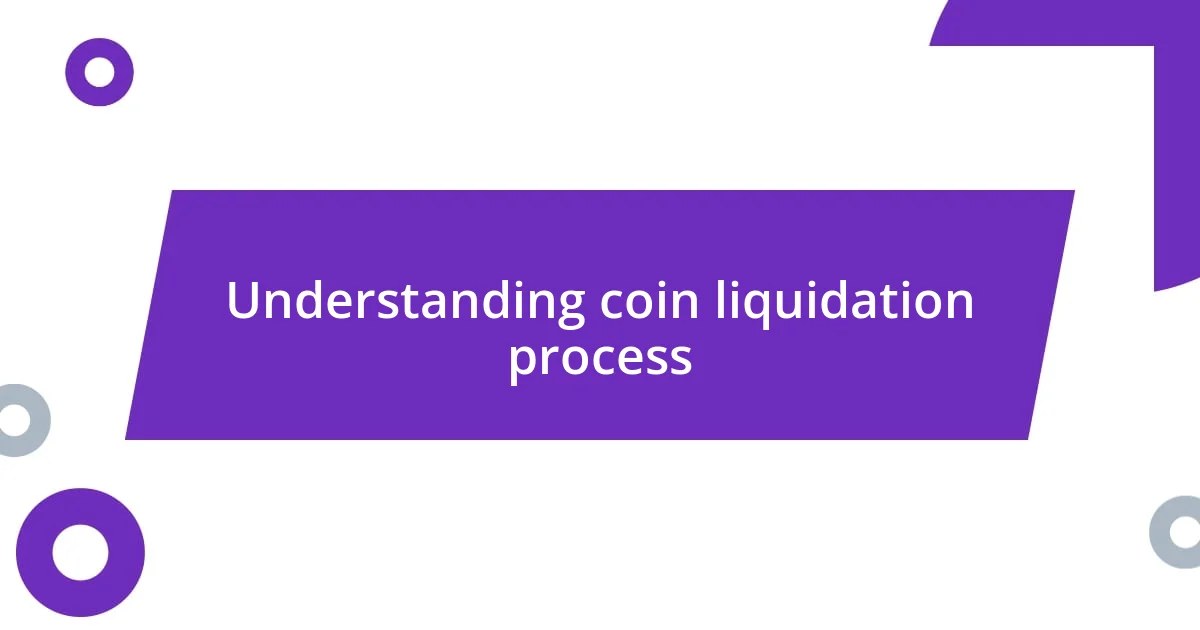
Understanding coin liquidation process
Understanding the coin liquidation process can be both fascinating and intricate. I remember the first time I decided to liquidate my collection. It felt like letting go of treasured memories yet also exciting because I had a chance to turn those coins into cash. Have you ever felt that mix of nostalgia and anticipation when parting with something valuable? It’s a common emotional tug-of-war.
As I delved deeper into this process, I realized that every coin has a story, and understanding its worth hinges on factors like rarity, condition, and market demand. I once came across a coin that I thought was just an old piece of metal; to my surprise, its historical significance made it worth far more than I had imagined. Isn’t it incredible how something seemingly ordinary can hold such value?
Moreover, I learned that where and how you choose to liquidate can significantly impact your return. From auction houses to online platforms, each route has its nuances. I often ask myself, what environment feels right for my coins, considering the emotional weight they carry? Engaging in this decision-making process not only deepens my understanding but also turns liquidation into a personal journey.
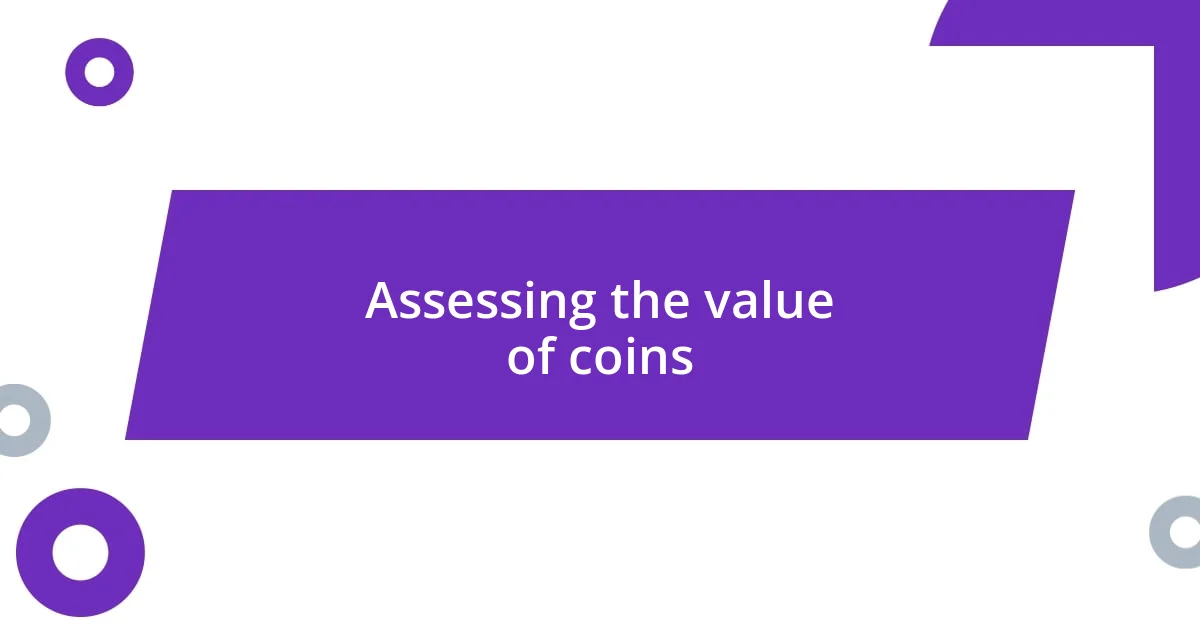
Assessing the value of coins
Determining the value of coins requires a keen eye and a bit of research. I remember standing in front of my old collection, holding a coin I’d inherited from my grandfather. Its worn edges and muted shine had sentimental value, but understanding its market worth meant looking beyond those memories. Rarity and demand were key players in its valuation.
When assessing a coin, consider these vital factors:
- Rarity: Fewer coins mean potentially higher value.
- Condition: Coins are graded on their physical state; a higher grade often commands a premium.
- Historical Significance: Coins tied to significant events or figures can be worth more.
- Market Demand: Prices fluctuate based on what collectors are currently seeking.
- Popularity: Some coins are in high demand due to trends or collector interest.
Each of these elements played a role in how I approached my own liquidation journey. It was enlightening to learn how a common piece could morph into a prized possession simply based on its unique characteristics. This realization not only enhanced my understanding but added a new dimension to my connection with the coins, as I acknowledged their intrinsic value beyond mere metal.
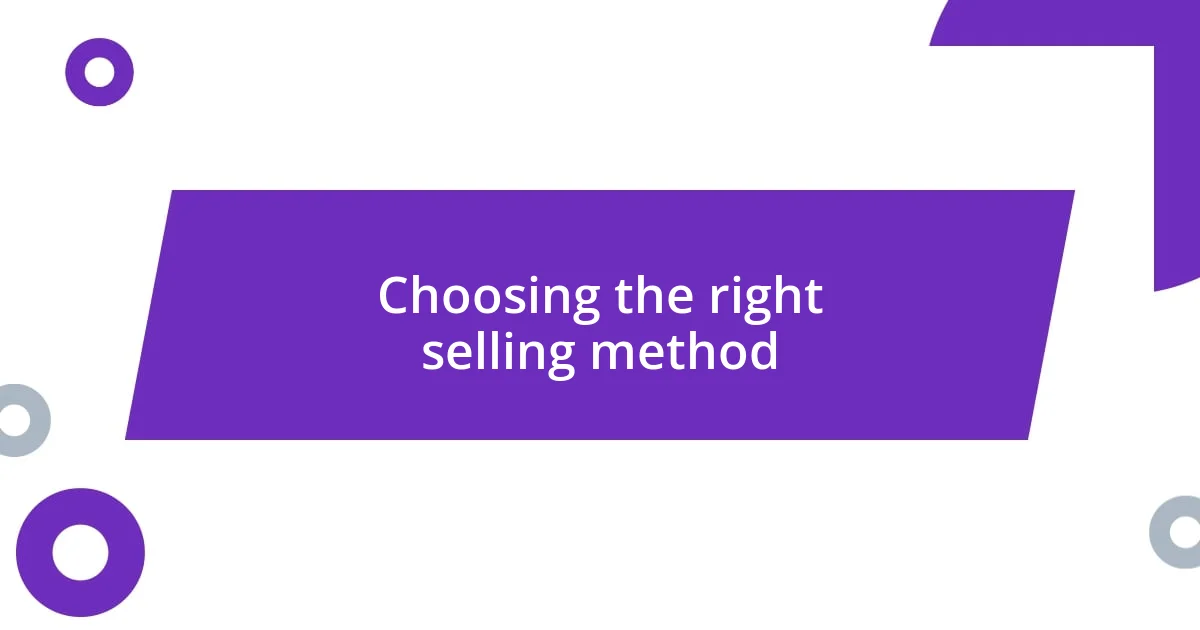
Choosing the right selling method
Choosing the right selling method can feel daunting, especially when considering the emotional attachments we have to our coins. I remember grappling with whether to take my coins to a local dealer or list them online. Each option comes with its pros and cons. For instance, local dealers might provide immediate cash but could offer a lower price. On the other hand, online platforms often attract a global audience, potentially maximizing my returns.
There are various ways to sell coins, and choosing the right one depends on your goals and circumstances. I’ve tried hosting a small auction myself, which turned out to be a fun way to engage collectors. It was exciting to see others appreciate my collection, but I also had to manage the hassle of setting everything up. Have you ever found yourself weighing excitement against convenience? That balance is critical in the decision-making process.
Understanding your target audience also influences your selling choice. When I opted to sell my rare coins online, I tailored my descriptions to attract serious buyers, highlighting the unique aspects that made each piece special. Did I have apprehensions about how they’d be received? Absolutely, but it ultimately taught me a valuable lesson about crafting an enticing narrative around my collection. Knowing who you’re selling to not only impacts the method but also the results.
| Method | Pros | Cons |
|---|---|---|
| Local Dealer | Immediate cash | Potentially lower offers |
| Online Auctions | Wider audience | Time-consuming |
| Private Sales | Negotiable pricing | Trust issues |
| Coin Shows | Direct engagement | Travel required |
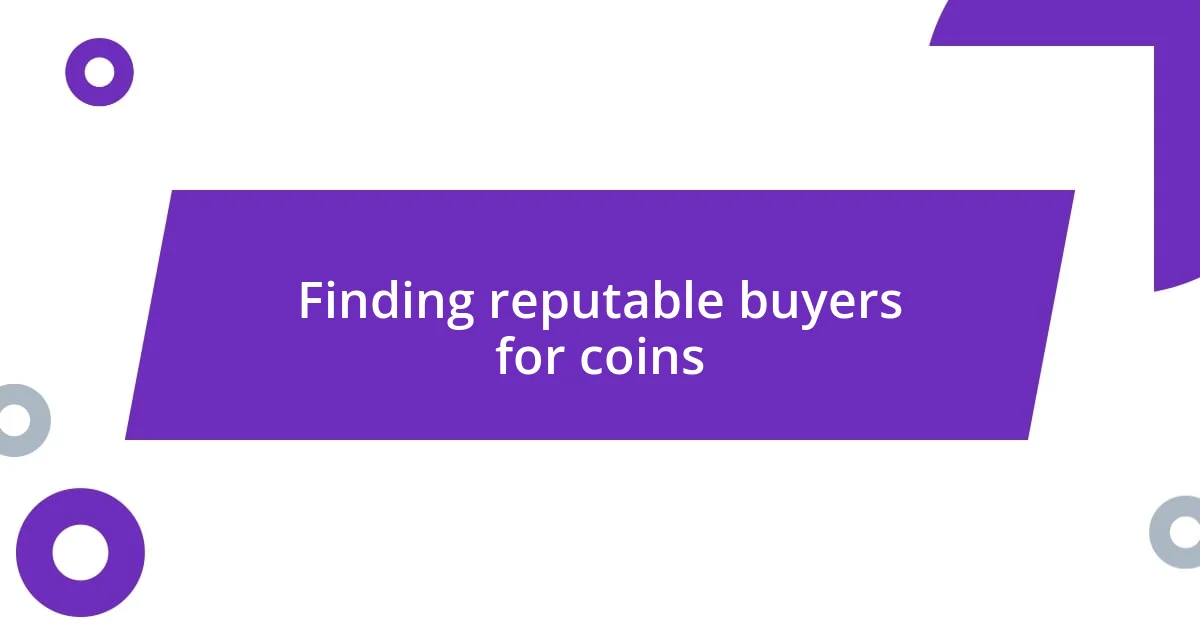
Finding reputable buyers for coins
Finding reputable buyers for your coins can be a bit like dating—you want someone trustworthy, knowledgeable, and respectful of your collection. I remember my first experience selling coins; I felt nervous, not knowing if a dealer was genuinely interested in fair transactions or just out for a quick profit. My advice is to start by seeking recommendations from fellow collectors or numismatic clubs. This helped me connect with buyers who respected the value and history behind my pieces.
Another approach is to research online reviews and platforms before making a decision. I recall discovering a local dealer through an online forum where enthusiasts shared their experiences. I hesitated at first, fearing scams or dishonest practices—but when I finally met him, his passion for coins and genuine interest in my collection put me at ease. It’s essential to trust your instincts; if something feels off, it probably is. Have you ever walked into a shop and instantly felt the vibe was wrong? That’s your intuition speaking!
Patience is key when finding reputable buyers. I learned this lesson the hard way when I rushed to sell an entire batch only to encounter a less-than-satisfactory experience. Instead, take your time to evaluate potential buyers, compare offerings, and don’t hesitate to ask questions. They should be willing to share their expertise and discuss your coins’ history. After all, you’re not just selling metal; you’re passing on stories that deserve to be appreciated and valued.
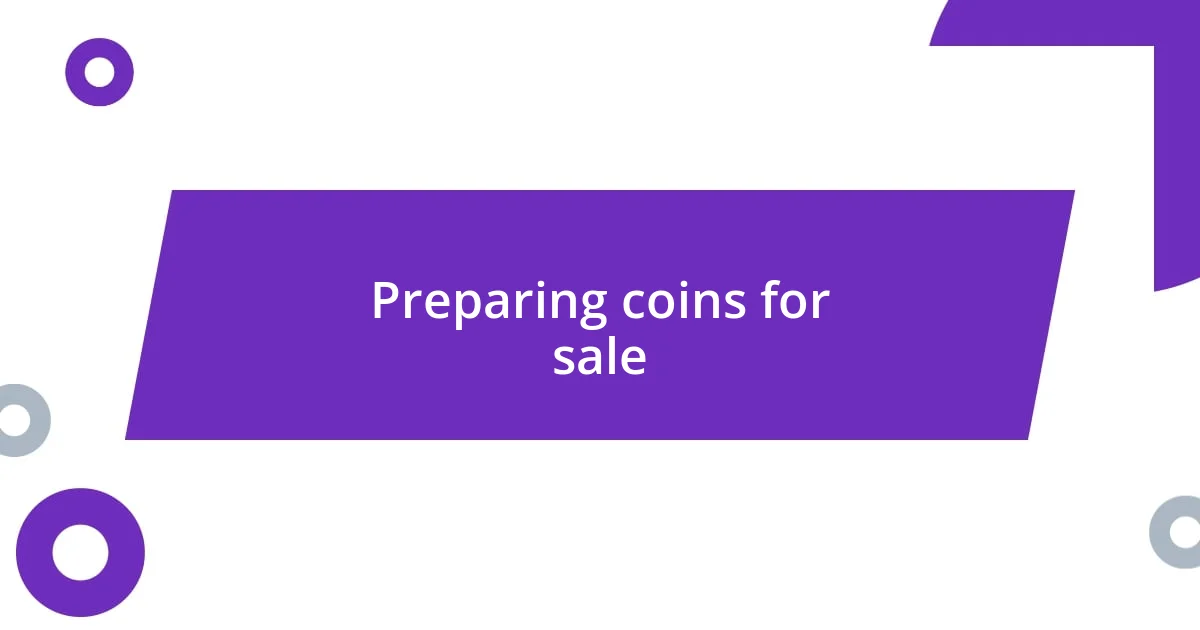
Preparing coins for sale
Preparing your coins for sale isn’t just about putting them up for grabs; it’s a process filled with personal significance. I still remember the first time I took a close look at my collection, feeling a bittersweet mix of nostalgia and excitement. Cleaning and organizing each coin can evoke memories connected to the moments when I acquired them. It’s essential to assess their condition and, if necessary, gently clean them. Just be careful—overzealous cleaning can sometimes devalue a coin!
I find that cataloging my coins helps me not just in terms of organization but also in understanding their worth. You might ask: why go through that extra step? Well, when I took the time to document details like mint marks, year of issue, and unique features, it transformed my perspective. Suddenly, my collection felt less like a jumble of metal and more like a curated set of stories waiting to be told. I recommend keeping a digital or physical record, as this can also serve you well when discussing the value with potential buyers.
Finally, consider taking quality photographs of your coins. I remember being pleasantly surprised by how much clearer and more attractive my collection looked through the camera lens. Good photos highlight the details that buyers want to see, like mint luster or any unique characteristics. Quality visuals are essential, especially if you’re planning to sell online; sometimes, they can make all the difference in attracting the right clientele. Have you ever been captivated by a well-shot image? It’s remarkable how the right presentation can draw attention and enhance perceived value.
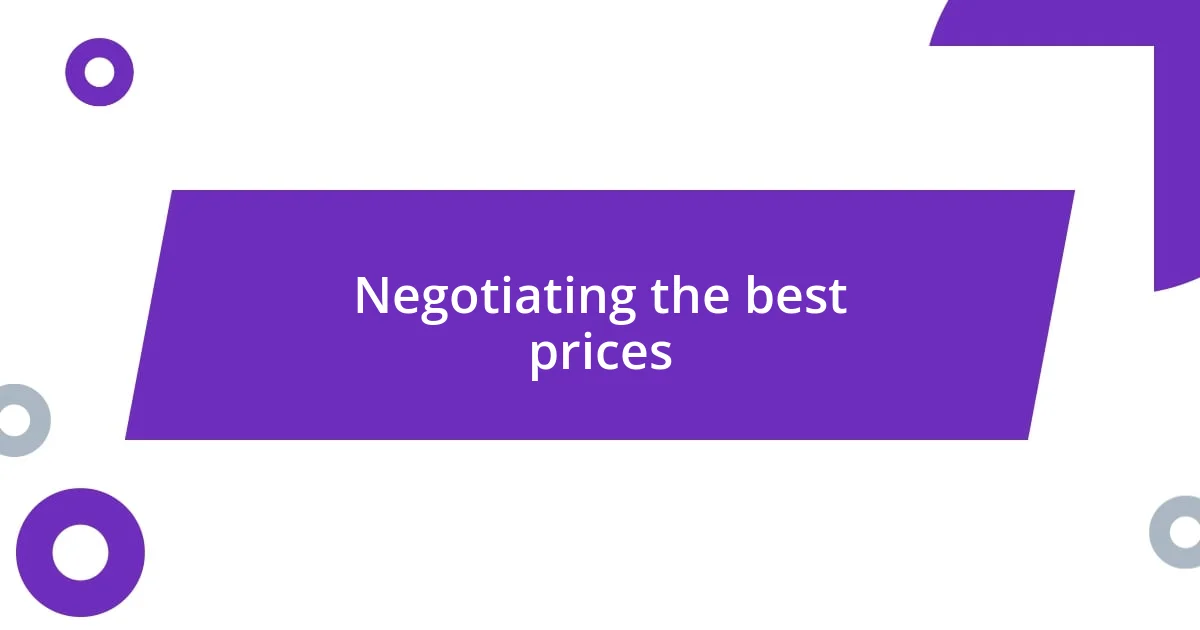
Negotiating the best prices
When it comes to negotiating the best prices, preparation is crucial. I vividly recall a time when I was selling a rare coin and felt overwhelmed by the potential buyer’s confidence. I quickly realized that knowing more about my coin’s market value made all the difference. By researching comparable sales and understanding current trends, I could walk into negotiations with confidence. Does that intuitive feeling of being informed resonate with you? It sure makes you feel empowered!
In my experience, establishing a rapport with buyers can significantly impact your negotiating power. I once had a conversation with a buyer who shared his own collecting experiences. This connection allowed us to discuss the coin’s historical context rather than just its monetary value. I found that when you focus on the story behind the item, it captures the buyer’s interest more intensely—don’t you think? People love a narrative, and it can lead to better offers.
Lastly, don’t shy away from being firm about your price expectations. I learned this the hard way during one sale when I hesitated to state my asking price, hoping for a friendlier negotiation. Instead, I left feeling underappreciated. Now, I initiate discussions by expressing a target price right off the bat. It sets the tone and shows that I value my collection. Remember, negotiation is as much about how you present your worth as it is about the numbers. How do you approach setting boundaries in negotiations? For me, it’s about respect for both my collection and the buyer’s interest.




